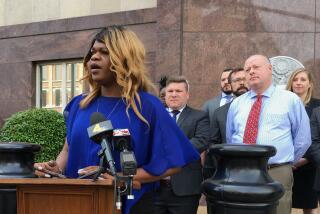Justices to Review Juror Gender Screening : Law: Lawyers in most jurisdictions have been permitted to create all-male or all-female panels. The high court may curb this power.
WASHINGTON — The Supreme Court on Monday agreed to consider whether to limit the power of attorneys to exclude potential jurors from a trial based on their gender.
Seven years ago, the court ruled that race cannot be the basis for keeping persons off a jury. Now, the justices said they will hear arguments in the fall on whether to extend the principle to cover gender as well.
In other action, the court let stand a preferential hiring plan for black firefighters in Cincinnati and refused to reconsider a ruling forbidding the distribution of Gideon Bibles in an Indiana public school.
The justices also deferred action in a high-stakes challenge to California’s unitary tax system for multinational corporations. The justices asked Clinton Administration lawyers for their view on the constitutionality of the tax before deciding whether to rule on the matter.
The issue of gender screening in juries came to the court in a paternity case from Alabama. Until now, lawyers in most jurisdictions have been permitted to try to create all-male or all-female juries, even if the trial focuses on an issue such as sexual harassment, rape or paternity.
Most judges, but not all, have routinely upheld this form of jury screening, believing that lawyers should have broad discretion to eliminate at least a handful of potential jurors based on a hunch they will not look favorably on their client.
In most states, lawyers for the prosecution and the defense can each exclude six to 12 members of the jury pool without giving a reason for their decisions. These are known as “preemptory strikes.”
While it is commonly said that a defendant has a right to a trial by a jury of his peers, the courts in fact have given lawyers broad power to try to shape a jury. Potential jurors may be excluded from the jury because of their age, occupation, education, religion, or even what books they read or clubs they belong to.
But the high court’s 1986 ruling in Batson vs. Kentucky put lawyers on notice that they may not follow a “pattern” of racial discrimination in selecting jurors.
Relying on that precedent, the U.S. 9th Circuit Court of Appeals based in California has ruled that excluding men or women from the jury pool simply because of their gender also violates the Constitution. By contrast, the Alabama Supreme Court ruled earlier this year that “gender strikes” are constitutional. It upheld a ruling by an all-female jury which concluded that James E. Bowman was indeed the father of a baby born to Teresia Bible.
That conclusion seems hardly in doubt since a blood test established his paternity with a 99.9% probability. A trial judge ordered him to pay $415 in child support.
But Bowman appealed and contended that his rights were violated by the prosecutor’s efforts to exclude males from the jury. In a brief order, the justices announced they will hear the case of J.E.B. vs. T.B., 92-1239, in October.
In the affirmative action case from Cincinnati, the justices refused to hear an appeal from white firefighters who said they lost jobs because of “quotas” that favored blacks.
The court also passed up an opportunity to permit more religious influence in the public schools. Last year, in a 5-4 ruling, the justices struck down a school-sponsored graduation prayer because it gave the appearance that public officials were endorsing religion.
Based on that precedent, a federal appeals court in Chicago ruled that school officials in Rennselaer, Ind., gave an unconstitutional “endorsement of religion” by encouraging the distribution of Gideon Bibles to fifth graders. Without comment, the high court refused to hear the school district’s appeal.
The California tax case sends a hot political issue to the Clinton Administration’s attorneys.
Last year, lawyers for the George Bush Administration had urged courts in California to strike down the state’s so-called unitary tax system for multinationals, arguing that it was ruffling the feathers of foreign governments. The state courts refused, but lawyers for Barclays Bank, a British-owned firm with offices in San Francisco, appealed the issue to the high court.
State officials urged the Administration to endorse California’s position, or at least to remain neutral.
They noted that the state could lose as much as $900 million in revenue if the justices ruled that California’s system was unconstitutional and ordered refunds.
Last month, the Administration appeared to chose neutrality. Its attorneys did not file a brief in response to Barclays’ appeal.
But on Monday, the justices issued an order asking for the Solicitor General to “file a brief . . . in the case of Barclays Bank vs. Franchise Tax Board of California . . . expressing the views of the United States.”
More to Read
Get the L.A. Times Politics newsletter
Deeply reported insights into legislation, politics and policy from Sacramento, Washington and beyond. In your inbox three times per week.
You may occasionally receive promotional content from the Los Angeles Times.











